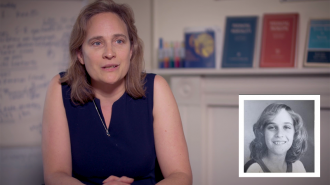
- Our studies
- Our research
- Publications and resources
- Data access and training
- About
- News
- Events
- Get in touch
- Join our mailing list

Welcome to our news and blogs section. Here you’ll find the latest developments and insights from across our longitudinal studies.
UCL and the University of Bristol are to lead the Population Research UK (PRUK) co-ordination hub, part of an existing strategic investment from the UKRI Infrastructure Fund.

Researchers from around the world have been using CLS study data to tackle important questions. Here is a round-up over 100 new pieces of research that we’ve added to the CLS bibliography between April and September 2020.

Children growing up in families with expensive homes have fewer emotional and behavioural problems, finds new research led by the UCL Centre for Longitudinal Studies (CLS) based at the UCL Social Research Institute.

How much does one’s family background influence their midlife wellbeing? And, what effect does technology engagement have on teenage sleep? What is the psychological impact of having to work part-time when full-time jobs are not available? And, how important is cognitive ability in helping people climb the social ladder?

Are boys more sensitive to the state of the local job market when choosing their GCSE subjects? And why are migrant and ethnic minority mothers at increased risk of mental ill health? Researchers have been using CLS study data to tackle these and other key questions.
In honour of the 50th anniversary of the 1970 British Cohort Study, this scientific conference will showcase the latest cutting-edge research using CLS cohort data.

Harmonised data from the 1946, 1958 and 1970 British birth cohorts on childhood environment and experiences are now available to the global research community via the UK Data Service.

Millennium Cohort Study findings have provided evidence for The Children’s Society’s eighth annual Good Childhood Report, which examines the state of children’s wellbeing across the UK.

Are boys more sensitive to the state of the local job market when choosing their GCSE subjects? And why are migrant and ethnic minority mothers at increased risk of mental ill health? Researchers have been using CLS study data to tackle these and other key questions.

With the 7-Up children returning to our TV screens this week at age 63 (4 June), Professor Alissa Goodman reflects on the importance of the show and the longitudinal studies she manages at CLS.
At this event, organised by CLOSER, we will present results on the measurement properties of mental health measures, before and after harmonising these so that they can be compared across time and study.

People who experienced physical abuse and neglect in childhood are at higher risk of poor health in middle age, new research shows.

Professor Emla Fitzsimons appeared on BBC Radio 4’s Analysis programme last night (4 February) to highlight Millennium Cohort Study research looking at the impact of family structure on children’s prospects.
Ryan Bradshaw
Senior Communications Officer
Phone: 020 7612 6516
Email: r.bradshaw@ucl.ac.uk